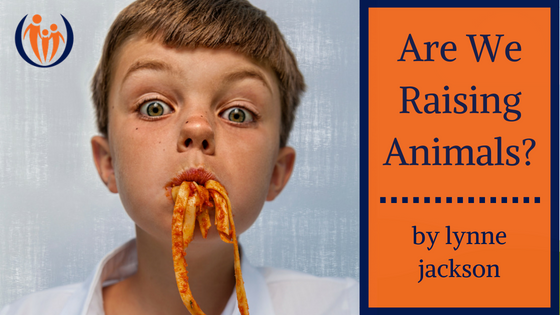
Are We Raising Animals?

There are so many little things our kids do that drive us crazy! Often in an effort to get the behavior to stop we react quickly and without thinking. We use body language and words that convey messages like, “You are a big problem!” or “You embarrass me!” Read what one dad had to say about an interaction with his son that combined correction with connection simply by changing his posture, facial expression, and choosing his words carefully.
“Are we raising animals??”
I glared across the table and asked my wife this question.
We had been eating our dinner of grilled peanut butter and banana sandwiches – a favorite in our home. At one point I looked over at my son and frustration rolled over me. Instead of taking bites of the sandwich, he was literally bent over the table stuffing the sandwich into his mouth at top speed – to the point where he looked like he had a tennis ball stuffed in his right cheek. It wasn’t the first time we’d seen this.
In my very best parenting (sarcasm added) I raised my voice, increased my physical posturing and loudly said, “Are you kidding me? How many times have we told you that you don’t stuff food into your mouth? We are not animals in this house and we won’t be eating like them. Do you understand me!?!”
He quietly complied.
A few minutes later he excused himself to use the restroom. I looked at my wife. “What are we raising, animals? Unbelievable.” I was still ticked. After being gone a few minutes he came back, sat down and began to eat again.
“Did you wash your hands?” I asked. The look on his face told me he hadn’t. A new wave of frustration was building.
He left to go and wash his hands and I followed him. (This doesn’t sound good!)
But in the moments between leaving the table and getting to the bathroom where he was finishing, I somehow (God’s grace) recognized that I needed to calm down. [Side note: This is the foundational work that Connected Families believes is so important when facing discipline situations.] I took a deep breath and quickly thought about what I wanted to do: continue yelling at him or try to turn this into an opportunity for connection and growth.
He came out of the bathroom, saw me waiting there for him and the look on his face said, “Uh oh.”
But I dialed down my voice, my tone, and my posture. My overall countenance softened and began to reflect my love for him. When I was calm I was able to think to myself, “I love this boy.” That helped me.
Directly but calmly I said, “Son, your mom and I get after you for this not simply because we want you to have good manners but because someday you will be out with your friends or at a girlfriend’s house having dinner with someone else’s family. My concern is that, if you eat with poor manners, they may think less of you or think you don’t know how to act around others. I would be sad for you if that happened.”
I had switched from a position that communicates “I’m against you” (quit stuffing your face like you’re an animal!) to shared interests that communicate “I’m for you!” (I care about you and want the best for you as you interact with others).
My son relaxed, seemed to understand and I could tell he was listening. Together we talked about remembering to eat meals slowly – particularly something as good as a grilled peanut butter and banana sandwich!
As you consider your end goal for your child (good table manners!) your tone, word choice, and facial expression communicates either shame (you are a problem) or coaching (you can learn this!). If you are concerned about sounding shaming, consider practicing what you are going to say ahead of time in front of a mirror or with a spouse.
Too many times when we correct our kids we can get stuck in our own short-term perspectives, and engage from a position of power. But if we focus on our shared longer-term goals, our child will catch a glimpse of the loving intent we have when we confront their behavior. This will communicate to your child, “I am FOR you!”
Slowing down and expressing to our children why we want to “fix” a certain habit not only shows them that we care, but that we want to help them. So next time your child wipes his mouth on his shirt at the dinner table, picks her nose, or chews his fingernails pause and think to yourself, “I love this child. What’s my long-term desire for him? How can I help him in a gentle but firm way to begin changing this habit?” The best result will come when your child sees you as their ally and not their enemy!
Frustrated by constant discipline challenges? Take 15 minutes to read our free ebook 4 Messages All Children Long to Hear: A Discipline That Connects Overview.







